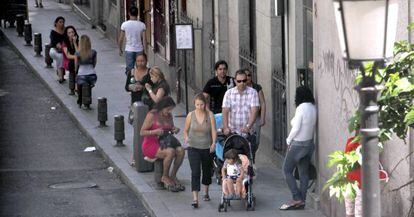Madrid targets prostitution as number of street workers rises
Popular Party mayor of capital presents proposals to "eradicate demand"

The recession has increased the number of women resorting to prostitution in Madrid, where the proportion of Spanish sex workers is rising in a sector that was, until recently, almost exclusively made up of foreign women. The city of Madrid has gathered data on the current state of prostitution in the capital, including, for the first time, figures on paid sex between men.
Mayor Ana Botella of the conservative Popular Party on Friday presented a plan "to eradicate demand" and to "provide comprehensive support" for the prostitutes, by "offering them a feasible alternative."
The initiative is a continuation of a program that began in 2004 under former mayor Alberto Ruiz-Gallardón, and which runs on a 1.1-million-euro budget until 2016. One of Ruiz-Gallardón's priorities was to push prostitution away from the city center, where sex workers were approaching prospective clients in full daylight, notably on Carretas street.
Prostitution lies in a regulatory limbo in Spain, being neither legal nor illegal as there is no related legislation. This has forced authorities to find creative ways to get the sex trade off the streets.
One of the new ways in which city officials plan to put pressure on prostitution is to inform the parents of any minors caught by police trying to pay for sex.
Botella wants a debate on fining clients but accepts that "Spain is evidently not Sweden"
Another way is to intensify the work of cleaning services in areas known for prostitution.
"This is not a regulatory instrument that is going to fine the clients or the prostitutes, it is simply a working tool," said Dolores Navarro, Madrid's commissioner for social affairs.
Fines may be handed out under a future ordinance still being developed by the city council, but Botella has already stated that "in no case" will prostitutes be fined. Botella did express support for sanctioning the clients, following the Swedish model, but added that for now she is content to simply "open up the debate" in Spain, because "Spain is evidently not Sweden."
A few months ago, the Interior Ministry seemed inclined to follow the example of the Catalan government and the city of Barcelona (both of which are ruled by the center-right nationalists of CiU) and fine any prostitutes found working on the streets. But Botella said she has not discussed the issue with the central government yet.
Since 2004, Madrid has operated a support center and a mobile unit to assist the city's prostitutes. Between 2004 and 2011, the Concepción Arenal center has helped 1,573 women, 94 percent of whom were foreigners. Women go there to get help finding a job and information about welfare benefits they might be eligible for. Between 2009 and 2011, the center aided 714 women, of whom 449 abandoned prostitution.
While the vast majority of clients are men who seek sex with women, some seek homosexual relations, a trend that is "less well known" and of particular concern to city officials because of its "clear involvement" in sexually transmitted diseases like AIDS. The city's figures also showed that clients are getting younger, a matter "of particular concern."










































